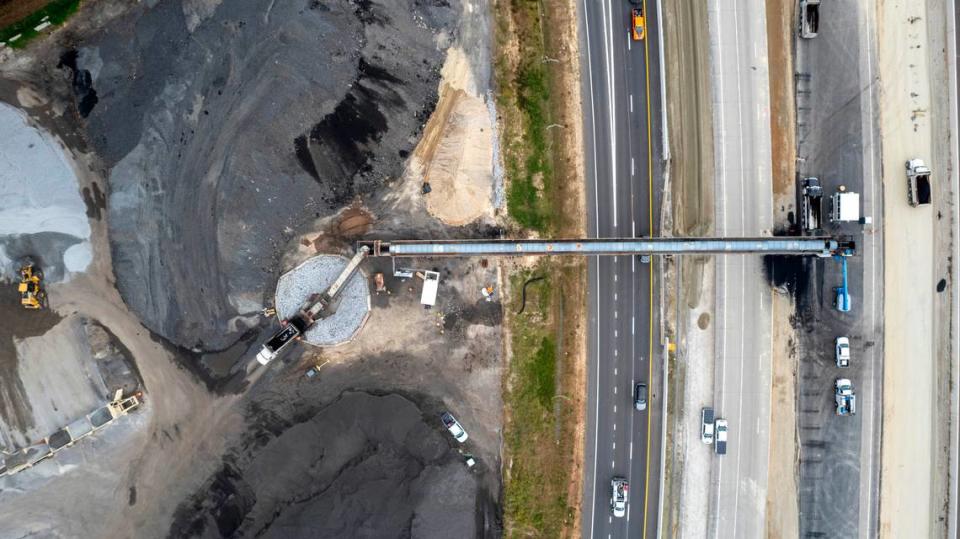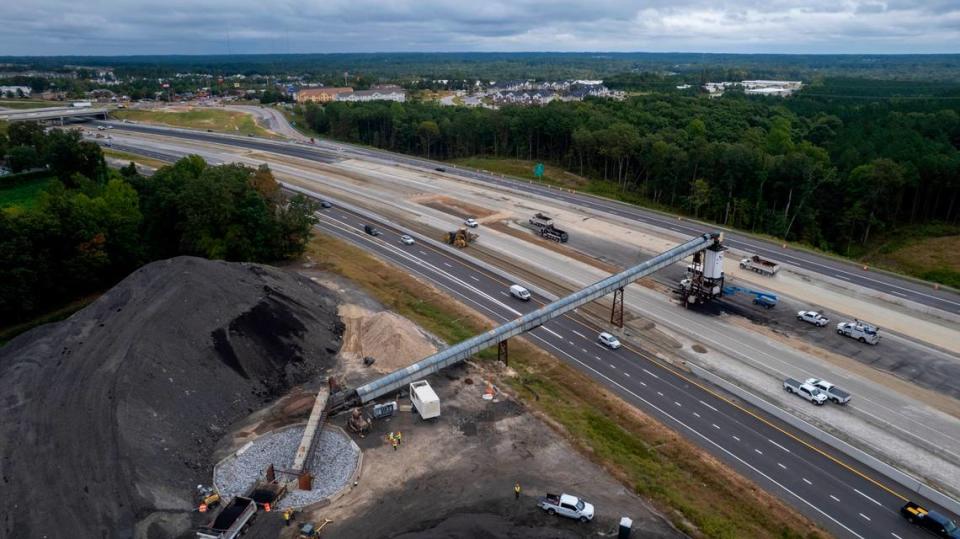Rising over the highway, conveyor belt carries hot asphalt to I-40 construction zone
To pave a section of interstate highway takes lots of hot asphalt carried in the backs of dump trucks that often must lumber through traffic to get where they’re needed.
S.T. Wooten Corp., the Wilson-based company that’s widening Interstate 40 in Johnston County, is trying something different.
The company has built a conveyor system near the N.C. 42 interchange that carries asphalt over the eastbound lanes of I-40 to the median. There, the steaming asphalt is loaded onto trucks that carry it to the paving machines.
S.T. Wooten expects the conveyor will move about 175,000 tons of asphalt from its plant off Cleveland Road in the coming months, enough to pave 5 miles of eight-lane highway. At 20 tons per load, that’s about 8,750 trucks that won’t have to drive through the N.C. 42 interchange onto I-40, cross traffic to the median and then return empty to the plant.
“That’s a big deal for us,” said Matt Davis, project manager for S.T. Wooten. “I don’t know if you’ve traveled this stretch of I-40, but it’s a very, very busy place. To take that many trucks out of traffic is a benefit for us, the traveling public and the state from a safety standpoint.”

It took more than a month to assemble the 281-foot-long conveyor system, which carried its first load of asphalt on Monday. S.T. Wooten expects to use it for at least three to four months, Davis said.
This isn’t the first time a construction company has substituted conveyor belts for trucks. In 2019, a team of three companies built a conveyor system to carry the equivalent of 109,000 truck loads of dirt over I-95 for the new Fayetteville Outer Loop interchange south of Hope Mills.
A decade earlier, S.T. Wooten used a conveyor to move rocks and asphalt to the median of I-40 near Chapel Hill Road in Cary where the highway was widened from four lanes to six.
But the practice is still relatively unusual. Not every pavement job is big enough to justify building a conveyor system or has the right circumstances for it to work.
In this case, S.T. Wooten already had an asphalt plant at the N.C. 42 interchange. The company has to truck the hot asphalt only about 75 yards from where it’s made to the hopper at the end of the conveyor.
There’s also plenty of room for the conveyor system to operate. The N.C. Department of Transportation has shifted traffic onto new lanes at the edge of the highway from the Clayton Bypass to beyond the N.C. 42 interchange, creating space in between where the bulk of the new highway will be built, said Robert Bullock, deputy division construction engineer for NCDOT.
“While we have to maintain the existing amount of lanes, we kind of build to the outside — shift traffic around — which frees up the median to have somewhere for the material to come off the end of the conveyor system,” Bullock said.

Thousands pass under the asphalt each day
People on I-40 bound for Benson, Wilmington or South Carolina may not think twice about what’s passing over their heads in the metal contraption that houses the conveyor belt.
The asphalt is about 300 degrees when it comes out of the plant and is dumped into the hopper at the bottom of the conveyor. The belt is enclosed as it rises to about 45 feet over the highway and drops the asphalt into a white silo capable of holding 80 tons.
Trucks back under the silo, and workers inside a control booth release the black mixture in streams, using cameras to determine when the bed is full.
Besides keeping trucks off the road, the conveyor system is more efficient. S.T. Wooten can use fewer trucks, because it’s easier to maintain a steady flow of hot asphalt to the site, Davis said.
And S.T. Wooten doesn’t have to worry about NCDOT restrictions that aim to prevent paving work from interfering with traffic. While the department usually limits contractors to working at night or during non-busy daytime hours, the company can operate the conveyor when it wants to.
The paving work around N.C. 42 is part of a multi-year effort to add two lanes in each direction to I-40 south of Raleigh. In April, S.T. Wooten finished the new lanes between the Raleigh Beltline and the U.S. 70 Bypass and expects to finish widening the highway east of the bypass by the end of next year.
The project also includes a new N.C. 42 interchange, to include a diverging diamond traffic pattern and new ramps that give drivers the option of getting on or off at Cleveland Road. It’s also scheduled to be finished next year.

